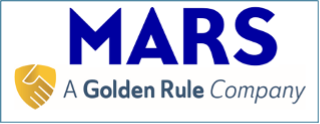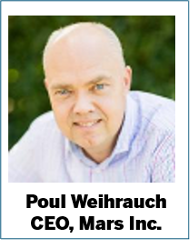Mars: A Golden Rule Company
 Founded in Tacoma, WA in 1911 and today based in McClean, VA, this company is among the first known large companies to practice the principles of stakeholder capitalism or what it calls the Economics of Mutuality—building companies to solve meaningful human and environmental problems profitably, not just to generate profit.
Founded in Tacoma, WA in 1911 and today based in McClean, VA, this company is among the first known large companies to practice the principles of stakeholder capitalism or what it calls the Economics of Mutuality—building companies to solve meaningful human and environmental problems profitably, not just to generate profit. Click here to subscribe to the ESM weekly e-newsletter.
Some companies seek to practice what they preach. One of the largest US privately held companies also chooses to preach what it practices: the Economics of Mutuality, a strategy based on its own core principles: Quality, Responsibility, Mutuality, Efficiency, and Freedom.
In the selection of Mars Inc. as a Golden Rule Company, EEA honors the company not only for its consistent practice of stakeholder management across multiple family generations but for its investment in sharing what it believes to be the core of its success with the world, including competitors, through the creation of the Economics of Mutuality in 2009. See ESM: Economics of Mutuality Is Out to Change Capitalism.
The Golden Rule Company award is based on an analysis of companies with enough public information to identify their practice of win-win capitalism: enhancing returns for investors only by creating value for customers, employees, distribution and supply chain partners, and communities.
As with any designation of this nature, skeptics abound. Some could criticize Mars for its traditional focus on creating sugary treats sold around the world. On the other hand, if one even drops the company’s Golden Rule score by a point for having been founded by confectioners in 2011 selling candy, the company will still meet the threshold for a Golden Rule Leader based on its principles and practices.
Mars has evolved from being a privately held global manufacturer (known for confectionery and pet care) into one of the foremost corporate advocates for what it calls mutual value creation.
Developed over 15 years within Mars and later institutionalized through partnerships with Oxford University Said School and the Economics of Mutuality Foundation (EoM), mutual value creation provides a rigorous framework for measuring and managing holistic performance — financial, social, human, and natural capital. By actively sharing this model and helping other firms adopt it, Mars moves beyond self-interest toward making a systemic impact — a hallmark of a company living the Golden Rule.
Here’s how the EEA scores Mars in the following stakeholder categories. Note that the EEA provides a curve in relation to the average organizational performance. Many good companies don’t quite make the cut, as a high standard is the best way to establish a clear paradigm for excellence.
Customers. 4.0. According to publicly available data, Mars’ products are highly popular with consumers. It has a respected brand and at least an average net promoter score, according to Comparability. The company has demonstrated efforts to improve the formulations of its confectionary products to make them healthier.

Employees. 5.0. Mars invests heavily in people development, inclusion and its purpose-driven culture. The company has an exceptionally high Glassdoor rating of 4.3 and its CEO Poul Weihrauchhas a 93% approval rating; 86% would recommend the company to a friend.
Distribution and supply chain partners. 4.0. In many cases working in challenging parts of the world, Mars by all appearances applies its EoM thinking to help empower suppliers and farmers — particularly in supply chains for palm, cocoa, and mint grown in difficult conditions— providing help with financing and training. Because progress is difficult, it remains imperfect in some regions, but the company has made a demonstrable commitment to its principles.
Communities. 5.0. In addition to its numerous philanthropic activities of its Mars Wrigley Foundation, the company’s investment in the Economics of Mutuality Foundation and related activities to enhance capitalism is a singular community investment. Mars has donated its economics of mutuality intellectual property and frameworks to Oxford’s Saïd Business School, and the EoM Foundation says it helps organizations of all types measure non-financial value. This outreach multiplies Mars’ positive societal footprint.
The environment. 4.0. According to its sustainability report, Mars appears to have established realistic, science-based targets (net zero by 2050, 50% reduction by 2030) and has made progress on its deforestation, water management, and packaging initiatives. It continues to face many challenges given its far-flung rural operations.
Total score: 22
Enterprise Engagement Alliance Services
 Celebrating our 15th year, the Enterprise Engagement Alliance helps organizations enhance performance through:
Celebrating our 15th year, the Enterprise Engagement Alliance helps organizations enhance performance through:1. Information and marketing opportunities on stakeholder management and total rewards:
- ESM Weekly on stakeholder management since 2009. Click here to subscribe; click here for media kit.
- RRN Weekly on total rewards since 1996. Click here to subscribe; click here for media kit.
- EEA YouTube channel on enterprise engagement, human capital, and total rewards since 2020
 Management Academy to enhance future equity value for your organization.
Management Academy to enhance future equity value for your organization.3. Books on implementation: Enterprise Engagement for CEOs and Enterprise Engagement: The Roadmap.
4. Advisory services and research: Strategic guidance, learning and certification on stakeholder management, measurement, metrics, and corporate sustainability reporting.
5. Permission-based targeted business development to identify and build relationships with the people most likely to buy.
Contact: Bruce Bolger at TheICEE.org; 914-591-7600, ext. 230.














